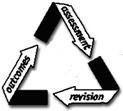Assessment Brief #107 - Higher Learning Commission Accreditation Review Results

February 2020
Higher Learning Commission Accreditation Review Results
As noted in Assessment Brief #104, Miami's Year 4 offsite Assurance Review with the Higher Learning Commission (HLC) took place in fall 2019. The HLC narratives and supporting evidence were shared in its online assurance system and were reviewed by a team of faculty and staff members from peer universities in September and October 2019. The team's report was received in late October.
All parts of the review results were extremely positive, including those concerning assessment. All of the HLC accreditation criteria and core components were met, and no sanctions or interim monitoring were recommended.
The following statements from the team report concerned student learning assessment at Miami:
Goals for student learning in the core curriculum (Global Miami Plan) are centered around the AAC&U's LEAP competencies. Since 2015, the university has further developed its assessment processes by creating evaluation rubrics for five of the competencies and piloting assessment of capstone courses. Evidence of robust assessment of written communication and critical thinking competencies was presented, including incorporation of multiple measures, and scoring of artifacts by a faculty committee. The assurance argument states that instructors may assess other LEAP competencies; however, evidence of implementation was not included. Reports for recent years substantiate that the university is following its processes for assessment of the core curriculum and that these processes have been effective.
Miami University's policies require at least three learning outcomes and processes for assessment for each of its academic programs and free-standing certificates. The program outcomes, listed on the university's public website, are clearly stated. Examples of academic program plans, reports and feedback substantiate that the university has implemented effective processes for assessment. The spreadsheet for the College of Arts and Science indicates that programs have been annually assessed with feedback since 2015.
Assessment of learning in co-curricular and student support programs has just gotten underway. Feedback from the first year of assessment indicates that programs are on track to develop full-cycle assessment processes.
The university provided examples of how information gained from assessment was used to improve student learning in the core curriculum and academic programs. These improvements encompassed changes to curriculum, resources, and the assessment process itself.
Miami has taken steps to address concerns raised in the 2015 HLC Team Report about consistency in the quality of assessment activity. A University Assessment Council now coordinate policies and procedures; collects and reviews assessment reports; and provides training, guidance, and support. Standard templates, sample rubrics and examples of reports are available on the assessment website. These actions, among others, should ensure a more consistent implementation of regular assessment activity.
Miami's assessment practices include evidence of the substantial participation of faculty and other instructional staff. In addition to the University Assessment Council, department coordinators and curriculum committees participate in assessment. A review of recent assessment reports substantiates that assessment results are discussed in faculty meetings. Feedback on assessment collected from department coordinators was shared in a 2018 assessment brief. Evidence indicates that good practice methodologies continue to be incorporated as the university gains experience with assessment.
Miami continues to demonstrate responsibility for the quality of its education programs, learning environments and support services. Faculty staff and administrators are actively involved in determining curriculum, defining and assessing student learning outcomes, delivering instruction and student services. Program quality is further assured by relevant specialized program accreditation. Miami has taken steps to address concerns raised in the 2015 HLC Team Report about consistency in the quality of assessment activity. Goals for student learning are defined and assessed in the core curriculum and degree programs and are underway for co-curricular units. Using assessment results for improvement is an integral part of the process.
(HLC Team Final Report, pp. 37-38, 41)
The team report has validated the good work Miami continues to do in assessment and suggests areas where further evidence needs to be provided in next HLC comprehensive evaluation review, which will take place in 2025-2026.
Many thanks to everyone whose work contributed to Miami's assessment efforts and numerous other areas reflected in the HLC review.
The next phase of Miami's HLC accreditation process include submission of a Quality Initiative proposal during the summer of 2020 and a Quality Initiative report no later than summer of 2024. Miami is on the HLC's Open Pathway accreditation process as a result of its record of strong accreditation results and, therefore, may choose its Quality Initiative project.
Please contact William Knight, Assistant Provost for Institutional Research and Effectiveness, at knightw3@miamioh.edu or 513-529-1660, with any questions or concerns about the HLC accreditation process.

